John Cassidy's Blog, page 88
October 4, 2012
After Denver: Can Obama Bounce Back?
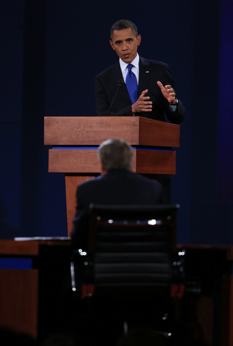
The challenger came in well-prepared and displayed an impressive command of the issues. He was sharp, energetic, and direct. Time and again, he corrected the President, politely but firmly pointing out that his proposals were being misrepresented. He gave a strong closing statement, and after it all ended, the pundits were in agreement that he had breathed new life into his campaign. The President, for his part, seemed a bit listless and distracted. He lacked zip and looked down at his notes a lot. All in all, he gave the impression he’d rather be at the dentist. Even some members of his own party admitted he had lost the debate.
The year was 1984. The President was Ronald Reagan, and the challenger was Walter Mondale. Before reading too much into last night’s debate in Denver, which the talking heads and Twitterers almost unanimously proclaimed a big victory on points for Mitt Romney (some pronounced it a T.K.O.), it is as well to recall a bit of history. This is but one debate of three, and the fundamentals still heavily favor Obama. He didn’t lose the election last night; far from it. But he certainly made it more interesting, which was the opposite of his intention going in. That nobody can deny.
...read moreOctober 2, 2012
Debate Preview: Six Reasons Why This Is Romney’s Big Chance
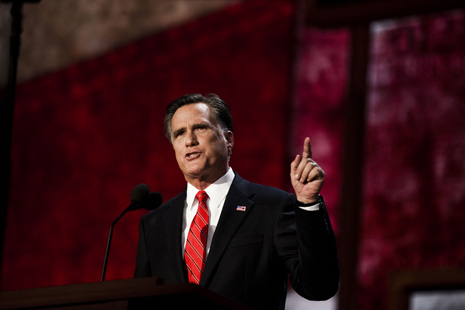
Less than thirty-six hours to go until Jim Lehrer asks the first question in Denver, and I, for one, am ready to go. In the past couple of days, in my role as D.P. (designated prognosticator), I’ve read the dispatches about both candidates decamping to the West for a couple of days of intensive prep. I’ve followed the ludicrous expectations game. “Gov. Romney, he’s a good debater. I’m just O.K.,” says Barack (The Great Communicator) Obama; “It’s not so much winning and losing … it’s about something bigger than that,” insists Mitt Romney, who has spent months preparing for what he clearly views as a championship bout. I’ve considered the importance of brevity, substance, accuracy, likability, and even, courtesy of The Daily, the number of times that a candidate blinks. (“Obama, who blinked 62 times per minute, trounced McCain who clocked in at 104 times per minute.”) I’ve been reminded of Richard Nixon’s five-o’-clock shadow in 1960; the George H. W. Bush “check my watch” moment, in 1992; and Michael Dukakis’s excruciating 1988 answer to Bernie Shaw’s hypothetical question about whether he’d favor the death penalty for somebody who raped and murdered his wife. I’ve even pondered the conventional wisdom among political scientists, which is that debates don’t matter much.
...read moreOctober 1, 2012
Memo to Mitt: Send for Ian Poulter, Hero of the Ryder Cup

After watching Sunday’s epic comeback by the European team in the Ryder Cup, I think the solution for Mitt Romney’s problems is obvious. With his first prime-time showdown with Barack Obama just two days away, he needs to hire as his debate coach Ian Poulter, the strutting English peacock who inspired the Euros to pull a Jesus act.
On Saturday afternoon, Poulter and his colleagues were looking in even worse shape than Romney. With two four-ball matches left on the course, they were down by ten points to four points. They appeared bedraggled and beaten. The American players, inspired by their young “bombers”—Keegan Bradley, Bubba Watson, Webb Simpson, and Dustin Johnson—were playing great, and the Chicago crowd, the biggest ever, perhaps, at a Ryder Cup, were wearing out their vocal chords chanting “U.S.A., U.S.A.” From a European perspective, it was getting embarrassing.
...read moreSeptember 29, 2012
Cassidy’s Count: The Obama-Romney Map is Turning Blue
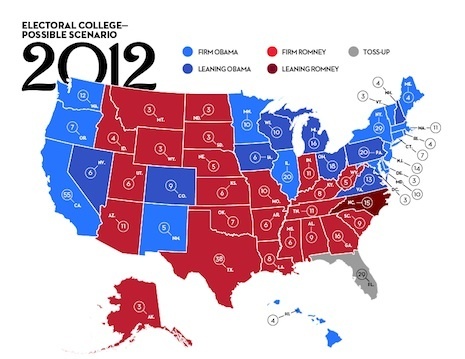
A few days before the first Presidential debate seems like a good time to look at the electoral map, which, at least according to the opinion pollsters, is moving in the direction of Obama and the Democrats. In almost all of the competitive states where the election will be decided, recent surveys show Barack Obama widening his lead, moving ahead, or closing on Mitt Romney. With two hundred and seventy votes in the electoral college needed for victory, projections based on recent polling show the President winning at least three hundred votes, and possibly quite a few more.
Karl Rove and other Republican strategists are suggesting that some polling organizations are overestimating the number of Democratic voters, but that argument is largely a red herring. In many swing states, successive polls carried out by the same pollsters, using the same sampling procedure, have showed Obama gaining ground. Even polling organizations that tend to lean Republican have found the same trend.
...read moreSeptember 27, 2012
Why Isn’t the Sluggish Economy Helping Romney?
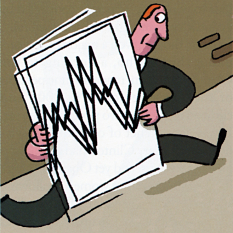
Another day in the campaign, another piece of bad economic news—several of them, actually—and another set of polling experts saying that Obama is heading for victory. It all raises anew the biggest question of Election 2012: Why isn’t the sluggish economy helping Romney more?
Let’s start with the polling experts: Larry Sabato and his colleagues at the University of Virginia’s Center for Politics. In their latest update on the state of the race, they moved five tossup states—Iowa, Ohio, Nevada, Virginia, and Wisconsin—into the Obama column, pushing him over the two hundred and seventy votes in the electoral college that he needs for victory. With the debates still to come, Sabato et al. stopped short of calling the election for the President, but they said, “Obviously, Romney needs to turn some of the blue on this map to red, or this race will be over.”
September 26, 2012
Obama on Free Speech: Was He Being Utopian?
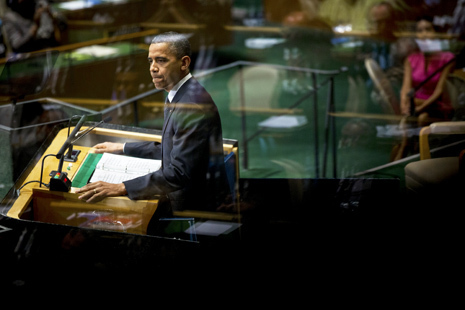
President Obama’s defense of freedom of speech before the United Nations has generally drawn positive reviews. The editorial page of the Times called it a “firm push back” against the anti-American violence in the Muslim world; the Washington Post said it was “refreshing.” John Avlon, of the Daily Beast, wrote, “this was the speech Obama needed to give—and the world needed to hear.” Even some of the people who have been criticizing Obama for failing to respond aggressively enough to the protests in Egypt, Libya, and other countries grudgingly praised the U.N. address. In a piece at the National Review Online, Brett Schaefer, of the Heritage Foundation, said the President’s defense of the First Amendment “was far stronger than had been previously articulated by the administration.” The Atlantic’s Jeffrey Goldberg said Obama went “part of the way” to redress his previous omissions.
...read moreSeptember 25, 2012
How Romney Could Still Win
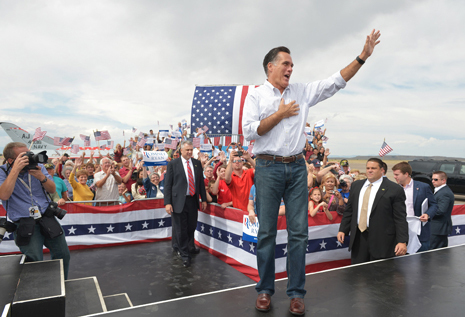
Karl Rove was on Fox News on Monday evening, analyzing the latest polls and talking up the chances of his boy Mitt. “It’s a close race,” he insisted. “Candidates are rarely as bad as they think they are, or the conventional wisdom thinks they are, or rarely as good as the conventional wisdom thinks they are.” And Rove went on: “It’s going to come down to the last ballot, at the last moment, on the last evening of the election.”
Given that Rove helps to run the biggest Republican Super PAC, Romney will be pleased that he hasn’t given up on him. But is there a realistic possibility of the Mittster turning things around? History is against him. The most recent Real Clear Politics poll-of-polls shows him trailing Obama by 3.7 percentage points. As FiveThirtyEight’s Nate Silver noted in a useful statistical update, since 1936 the only candidates who went on to victory after being behind in the polls in late September were Harry Truman in 1948 and George W. Bush in 2000. From a Republican perspective, the state polls look even more depressing than the national ones. On Monday alone, nine more of them were released, and every single one showed a move toward Obama. Tuesday bought yet more grim news for the Republican candidate: a new Washington Post poll in which he is trailing by five points in Florida and eight points in Ohio.
At the British bookmakers, the odds of a Romney victory are now about 100/30, which means you have to bet thirty dollars to win a hundred. This implies that the probability of Romney winning is about twenty-three per cent. At Intrade, the online prediction site, the implied probability is just a bit higher: twenty-seven per cent. Expectations of an Obama victory could easily become self-fulfilling, with voters (and donors) shifting their support to the candidate they think more likely to win. Appearing with Rove, Joe Trippi, the Democratic strategist, pointed to evidence that some voters who had previously identified themselves as independent are now calling themselves Democrats. The Washington Post’s Ezra Klein raised the Romney “nightmare scenario” of his rich backers deserting him en masse.
Let me be clear: I remain confident enough that Obama will win that, if Rove or anybody else is willing to offer me even odds, or even one-to-two, I’d happily bet on it. But the future is inherently uncertain, and the possibility of a Romney comeback can’t be wholly discounted. Opinion polls and betting markets are best regarded as snapshots of the prevailing wisdom at given point in time. Even at this relatively late stage of the campaign, the picture can change. Since 1972, as Silver pointed out, the average change between the polls in late September and the result on Election Day is close to five per cent. That’s larger than Obama’s lead in the poll-of-polls. While Truman and George W. were the only victorious candidates to come from behind, others have come close. In 1968, Hubert Humphrey was trailing Richard Nixon by double digits, and he ended up losing by less than a point. Even Michael Dukakis, widely written off in September, rallied late to throw a scare into the Bush camp.
According to the betting markets, Romney still has about a one-in-four chance of winning, which suggests that the task facing him is equivalent to tossing a coin twice and getting two heads in a row. That’s not easy, obviously, but it isn’t entirely out of the question, and it’s an interesting exercise to think about how it could be achieved. Here, just for the sake of argument, is a Romney victory scenario.
1. The Labor Department revises down the number of jobs the economy has created in the past couple of years. It hasn’t been talked about much, but this Thursday the Labor Department will release its annual revisions to the job figures, covering the period from April, 2010, to December, 2011. Based upon comprehensive figures gathered at the state level, these revisions can be substantial. The 2010 revision removed three hundred and seventy-eight thousand jobs from the official tally; the 2011 revision added a hundred and sixty-two thousand. This year’s revision could go either way, but if it wipes out some of the jobs “created” during last year’s uptick in job creation, as reported in the monthly employment reports, it will give Romney some ammunition he badly needs.
2. Romney does well in the first Presidential debate, which takes place in Denver next Wednesday. The one upside of Romney’s gaffe-plagued campaign is the low expectations it has created. As he showed during the G.O.P. primaries, he is a competent debater, with a willingness to beat up on his opponent where necessary. (Think Newt Gingrich in Jacksonville.) The subject of the first debate is domestic policy, which will give Romney a chance to go after Obama on his economic record and his lack of experience in the business world. Jim Lehrer, the moderator, will be keen to allay charges that he is too old or courtly to ask tough questions, but the onus will be on Romney to take control of the evening and challenge Obama head-to-head. Obama, doubtless, will be as articulate as usual, but for once he won’t be able to avoid talking about topics he generally avoids on the stump, such as the stimulus and the health-care-reform act.
3. The September jobs figures are disappointing. They will come out on Friday, October 5th, just two days after the first debate. If Romney emerges from Denver on a high, a poor employment report could give him more momentum. For some reason—perhaps because the Democratic Convention overshadowed it—the August figure of just 96,000 jobs created didn’t have much political impact, but another weak number could prove more troublesome for Obama. Forecasting the monthly job figure is a mug’s game, but, for what it’s worth, the number of people filing jobless claims fell by just three thousand last week, suggesting that the labor market is still depressed.
4. Paul Ryan outguns Joe Biden in the Veep debate, which is on Thursday, October 11th, and Romney holds his own in the second Presidential debate, which takes place in Hempstead, Long Island, on Tuesday, October 16th. With Ryan’s reputation as a good debater and Biden as a loose lips, the expectations game favors the Vice-President. But a gaffe on his part could still prove damaging. The second Presidential debate is a town-hall meeting moderated by CNN’s Candy Crowley. The format should favor Obama, but with real people asking the questions anything could happen.
5. The national polls tighten up. Both campaigns have been saying they expect this to happen, but so far there hasn’t been any sign of it. A good performance by Romney and Ryan in the first two debates could be just what the Republicans need to rally their supporters and win over some independents. If the Republicans can narrow the gap to two or three points with a couple of weeks remaining before the election, they will be hopeful of pulling off a shocker.
6. Amid more turmoil in the Middle East, Romney gets the best of Obama in the third and final Presidential debate, which takes place on Saturday, October 22nd, in Boca Raton. The session will be devoted to national security and foreign policy, an area where the polls show Obama with a strong lead, but also one where the Republicans think he is vulnerable. Turmoil abroad, especially when it involves the deaths of Americans, is always damaging to incumbents. The week the American Ambassador to Libya was killed, Obama’s poll rating dropped even though Romney’s grandstanding response was widely criticized.
7. Some key swing states move towards Romney. With the national polls tightening up, he moves comfortably ahead in Florida and North Carolina, and in Colorado, Iowa, Nevada, New Hampshire, Virginia, and Wisconsin he moves within striking distance. Ohio remains firmly in the Obama camp, but even without it there are eleven permutations that could see Romney to two hundred and seventy votes in the electoral college. (Thanks to Karl Rove for doing the combinatorial math.)
8. On November 6th, the late-breakers swing in Romney’s favor, and he virtually ties Obama in the popular vote. With most of the swing states, but not Ohio, breaking his way, it all comes down to Virginia, where the exit polls show the race a lot tighter than expected. Finally, close to dawn on November 7th, it emerges that Romney has won by a few hundred votes.
O.K. It’s not likely to happen, and if it does many of you will move to Canada, or threaten to. But it’s something to think about. After all, who doesn’t enjoy a good disaster movie?
See our full coverage of the campaign season at The Political Scene.
Photograph by Mandel Ngan/AFP/Getty.
September 24, 2012
“60 Minutes” Interviews Show Why Obama Is Winning
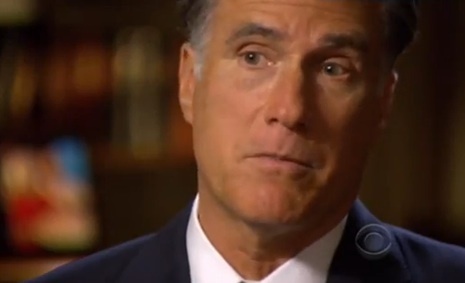
Many television interviews with politicians are hardly worth watching. The pol trots out his (or her) prepared talking points. The questioner tries to elicit a gaffe or an incendiary statement, which will generate some headlines. The viewer, bored, starts wondering whether the next commercial will be for a Statin, an anti-depressant, or a new Toyota Camry.
Sunday night’s interviews with President Obama and Mitt Romney on “60 Minutes” were more interesting than the norm. Perhaps because they ran in succession, or perhaps because they amounted to a preview of next week’s first Presidential debate, they provided an illuminating portrait of the two candidates, and why one is leading the other. Obama performed his usual shtick as the last reasonable man in Washington, a dogged defender of the ordinary American. Romney, despite acknowledging his own slip-ups and making some substantive points on entitlement reform, came across as a heartless rich guy.
There weren’t any big headline-makers. The closest thing to a zinger came when Obama accused Romney of war-mongering over Iran, saying, “If Governor Romney is suggesting that we should start another war, he should say so.” The closest thing to a gaffe came when the President referred to the death of four American officials in Libya, including the Ambassador, as “a bump in the road”—a statement some right-wing commentators have seized upon. Obama may also have upset some hardline supporters of Israel by describing it as “one of our closest allies in the region,” but that’s inside baseball.
Romney’s interview with Scott Pelley, which was shown first, was the meatier of the two. Inevitably, given the problems his campaign has encountered, the G.O.P. candidate was forced onto the defensive, as Pelley probed him about his personal finances, his plans for Medicare, and his campaign errors. But liberal viewers hoping to see a man beaten down by his predicament will have been disappointed. An upbeat Romney insisted, “I’m going to win this thing.” He answered most of Pelley’s questions directly, displayed a command of policy details, and attempted to dispel one or two myths about his intentions, saying, “I will not raise taxes on middle-income folks. I will not lower the share of taxes paid by high-income individuals.”
On Medicare and Social Security, he went considerably further than Obama has in explaining how he would safeguard the programs’ finances, and reaffirmed his explicit commitment to means-testing: “So what I do in my Medicare plan for younger people coming along is say this: We’re going to have higher benefits for low-income people and lower benefits for high-income people. We’re going to make it more means-tested. I think if we do that, we’ll make sure to preserve Medicare into the indefinite future.”
Listening to Romney talking like this, it was almost possible to believe he is a moderate and well-meaning fellow—the sort of candidate old-school Republicans were hoping to see when they rallied behind him. But other parts of Romney’s interview gave the opposite impression. Even when he is being careful about what he says, he sometimes comes across as uncaring and harsh. The problem isn’t just that he makes mistakes. It is that, in refashioning himself as a candidate acceptable to the Republican right, he has committed himself to a number of things that are deeply unattractive.
One is the notion of very rich people, with lots of savings, facing lower tax rates than regular, working people. Here’s the exchange on tax rates:
PELLEY: Now, you made on your investments, personally, about twenty million dollars last year. And you paid fourteen per cent in federal taxes. That’s the capital-gains rate. Is that fair to the guy who makes fifty thousand dollars and paid a higher rate than you did?ROMNEY: It is a low rate. And one of the reasons why the capital-gains tax rate is lower is because capital has already been taxed once at the corporate level, as high as thirty-five per cent.
PELLEY: So you think it is fair?
ROMNEY: Yeah, I think it’s the right way to encourage economic growth, to get people to invest, to start businesses, to put people to work.
PELLEY: And corporate tax rates?
ROMNEY: Corporate tax rates, also, I’d bring down and with the same idea.
Is it any wonder that Romney scores so poorly relative to Obama on the question of understanding the concerns of ordinary Americans?
A second deeply unattractive proposal is the idea of cutting health-care services for the poor. (All but confirming Bill Clinton’s warnings in Tampa, Romney boasted that sending Medicaid back to the states would save the federal government a hundred billion dollars a year.) A third is the idea that it’s O.K. for tens of millions of working Americans not to have any health-care coverage at all. This is a man, remember, who made the principle of universal health care law in Massachusetts. Now, though, he is determined to run as fast as he can from his own success:
PELLEY: Does the government have a responsibility to provide health care to the fifty million Americans who don’t have it today?ROMNEY: Well, we do provide care for people who don’t have insurance, people—we—if someone has a heart attack, they don’t sit in their apartment and die. We pick them up in an ambulance, and take them to the hospital, and give them care. And different states have different ways of providing for that care.
PELLEY: That’s the most expensive way to do it.
ROMNEY: Well the—
PELLEY: In an emergency room.
ROMNEY: Different, again, different states have different ways of doing that. Some provide that care through clinics. Some provide the care through emergency rooms. In my state, we found a solution that worked for my state. But I wouldn’t take what we did in Massachusetts and say to Texas, “You’ve got to take the Massachusetts model.”
Obama, in his “60 Minutes” interview—conducted by Steve Kroft, rather than Pelley—was understandably eager to draw the contrast. Whereas Romney said that the big idea that motivates him was restoring freedom, Obama said, “I think what Americans properly are focussed on right now are just the bread-and-butter basics of making sure our economy works for working people. And if we can accomplish that, there’s no bigger idea than that.”
With the polls getting more favorable for him by the day, Obama isn’t taking any chances. Rather than detailing his own plans for the future (or the lack thereof), which could open him to criticism, he is content to defend his record and criticize his opponents. He’s got his lines down, and he trotted out many of them to Kroft. After taking office in an economic emergency, he “made some tough decisions,” saved the auto industry, cut taxes by “thirty-six hundred dollars per typical family”—a figure some commentators are questioning—and opened the way to thirty months of job growth. And the Republicans, he said, were out to get him from Day One, which prevented him from fulfilling his vision of ending partisanship: “If you ask me what’s my biggest disappointment, [it] is that we haven’t changed the tone in Washington as much as I would have liked.”
The portrait of the reasonable man battling irrational forces is Obama’s calling card, and there’s probably enough truth in it to return him to the White House. In response to Kroft’s questions about the Middle East, he attempted to apply it to foreign policy, too. First, he asserted that his decision to support the “Arab Spring” revolutions was in America’s long-term interest, despite the presence of “demagogues” eager to exploit anti-American feeling. (It was here that he said, “there are going to be bumps in the road.”) Then he took a jab at Benjamin Netanyahu’s efforts to change U.S. policy towards Iran, saying his goal “is simply to do what’s right for the American people. And I am going to block out any noise that’s out there.”
Obama, ever the technocrat, appears to have been using the word “noise” in the statistical sense, where it refers to a random piece of data that doesn’t confer any underlying meaning. Netanyahu won’t like this description, but Obama seems content to lump him in with Mitch McConnell, Paul Ryan, Arab protestors, and others who talk and behave in an unreasonable manner. The President is above all that, or so he’d like the voters to believe. In the upcoming debates, Romney badly needs to find some way to break through his cool demeanor, get him ruffled, and elicit some sort of self-inflicted blow. Based on what we saw in the 2008 debates, and on Sunday night, that’s a tall order.
September 21, 2012
Why Is Romney Such a Loser? Seven Theories
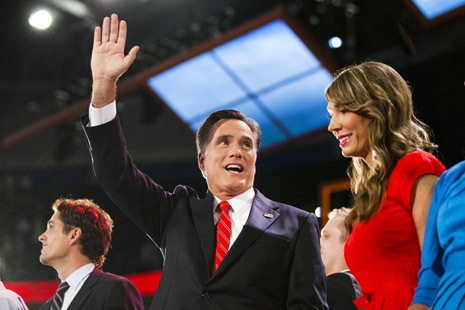
It’s a serious question. On the basis of fundamentals, the race should be a squeaker. The Yale economist Ray Fair’s prediction model, which ignores the opinion polls and just looks at economic factors, currently puts Obama’s share of the popular vote at 49.5 per cent, implying that Romney would almost certainly get a narrow majority in the electoral college and win the election. Because the margin of error in Fair’s forecasting equation is three per cent, he isn’t really predicting a Romney victory; he’s just saying that the race should be close, really close. As of today, it isn’t.
According to the Real Clear Politics poll-of-polls, which averages out all the most recent surveys, Obama is leading by more than three points. Since the start of the year, Romney hasn’t led the poll-of-polls. He has only drawn level once—immediately after the Republican convention. And in many of the swing states, such as Ohio and Virginia, the survey data looks even worse for him. He could still come back, of course, but at this stage it will take something dramatic to change the dynamics: a foreign-policy disaster, a terrible piece of economic news, a big slipup by Obama in the debates.
What’s gone wrong for Romney? Here are seven possible explanations:
1. The Romney campaign is incompetent. In a column a couple of days ago, Peggy Noonan, the former White House speech writer for Ronald Reagan, said publicly what many Republicans have been saying in private for months: “It’s time to admit the Romney campaign is an incompetent one. It’s not big, it’s not brave, it’s not thoughtfully tackling great issues. It’s always been too small for the moment.” Stuart Stevens, Romney’s mercurial campaign manager, is the piñata of the moment, with Republicans blaming him for everything from failing to settle on a clear message, hogging too much responsibility inside Team Romney—he’s in charge of speech-writing and advertising, as well as overall strategy—and bungling Romney’s speech at the convention. Stevens “sold himself as a kind of mad genius,” Noonan noted acidly. “I get the mad part.”
2. Romney is incompetent. No big-name Republican has come right out and said this, but many are increasingly convinced of it, especially following the emergence of the “forty-seven per cent” video. Bill Kristol, the editor of the Weekly Standard, called Romney’s comments on the video “stupid and arrogant.” In a column in Thursday’s Wall Street Journal, Karl Rove, who has been one of Romney’s biggest supporters, noted, “There’s little tolerance among Republican donors, activists and talking heads for more statements by Mr. Romney that the media can depict as gaffes.” It seems that almost every week lately Romney has had to walk back, or clarify, something embarrassing he’s said.
3. It’s all the G.O.P.’s fault. A month ago, on the eve of the Republican convention, I wrote a post saying that Romney’s main handicap wasn’t his campaign manager or his tendency to trip himself up but the fact that he was running as the representative of such an extremist and unpopular party. “It’s a protest movement rather than a party of government,” I wrote. “Even in the most favorable circumstances, it’s barely electable at the national level.” That still seems right. Even after his problems, Romney’s approval ratings (low forties) are running about ten points ahead of the G.O.P.’s ratings (low thirties).
4. Americans like Obama, or the idea of Obama. The high hopes of 2008 faded long ago, but outside of right-wing talk radio and other diehard Republican circles, there isn’t much overt animosity toward the President. To the contrary, most people seem to respect his calm approach and his repeated offers to work with the Republicans even though they have turned away all his overtures. Romney has tried to counter Obama’s personal popularity by arguing that he’s a nice guy who isn’t up to the job of President. So far, this argument doesn’t seem to be resonating with moderates and independents.
5. It’s the economy, stupid. Yes, the jobs picture is pretty dismal. But the unemployment rate, at 8.1 per cent, is a full percentage point below what it was at this time last year, and other economic indicators are looking up. A year ago, on September 20, 2011, the Dow closed at 11,408.66. On Thursday, the market closed at 13,596.93. In twelve months, it has risen by nearly twenty per cent. House prices, which have been depressed for years, are also picking up in many areas, as are housing starts. In Thursday’s Wall Street Journal, Michelle Meyer, an economist at Bank of America Merrill Lynch, said: “The housing recovery has indeed started.” For the one-in-four working-age Americans who are still out of work or working part-time because they can’t find full-time employment, the Great Recession is still very real. But for people in a job, many of who own their own home and have a 401K, the financial outlook has improved substantially over the past twelve months.
6. It’s all demographics. At the end of last year, Ruy Teixeira—the Washington-based political scientist who has long argued that the rising number of Hispanics, working women, highly-educated yuppies, and other Democratic-leaning groups in the electorate would deliver a stable governing majority to the Democrats—characterized the 2012 election as “Demographics versus Economics.” As of now, demographics may be winning out. On the national level, most opinion polls show a double-digit gender gap in Obama’s favor. Meanwhile, in formerly Republican states like Colorado, Nevada, and Virginia, the Hispanic share of the vote is rising rapidly, and Obama is running ahead despite heavy spending by G.O.P.-leaning groups.
7. Things aren’t really so bad. The contrarian case for Romney is that, despite all his goofs, he’s still doing fairly well in the national tracking polls—in Thursday’s Gallup update, the two candidates were dead level at forty-seven per cent—and he’s still got time to turn around the swing states. Karl Rove, while acknowledging Romney’s recent missteps, argued in his column that at this point in the 1980 campaign Ronald Reagan was trailing Jimmy Carter in some national polls. Referring to this week’s brouhaha over the fund-raiser video, Rove called it “a classic example of the commentariat investing moments with more meaning than they deserve.”
This one doesn’t withstand scrutiny: Romney’s campaign is in a world of trouble. Rove heads the biggest G.O.P. Super PAC, American Crossroads, and he played a significant role in persuading the Party to accept Romney as its candidate. He has a strong interest in talking up his prospects. And even he conceded that Romney “must reassure voters he’s up to the job of being president.”
The other explanations all have merit—and aren’t mutually exclusive. In any election, fundamental factors, such as demographics and the economy, are important. As Teixeira explained in a lengthy interview I did with him back in June, the country is changing so fast that Obama can afford to lose among white men by up to twenty percentage points and still garner enough votes to win. The lacklustre economy is still the biggest thing working in Romney’s favor, but rising stock prices and the nascent recovery in the housing market appear to be having an ameliorating effect.
Obama’s personal popularity also shouldn’t be underestimated. In an interesting piece earlier this week about why Obama is winning, Politico’s Jonathan Martin quoted Bill Carrick, a Democratic strategist, who said: “People like his personality, like his family, like his story and what he says about the country just by having been elected. And I think the other piece is that people really do believe he got dealt a really bad hand of cards. They’re willing to give him more of a chance.”
Still, Romney can’t entirely blame his woes on his opponent. After all, most Americans thought Jimmy Carter was a decent and admirable person, but that didn’t stop them from voting him out of the White House. When it comes to the job he’s doing, Obama still has low ratings. In Thursday’s Gallup tracking poll, forty-eight per cent of people disapproved of how he’s handling the Presidency and forty-six per cent approved. Numbers like these should make him vulnerable to attack.
Which brings us to Team Romney. From the very beginning, the Obama campaign has out-thought and outfought Stuart Stevens and his crew, relentlessly depicting the G.O.P. candidate as a clueless and heartless plutocrat. Such a strategy shouldn’t have come as any surprise to anybody, least of all the folks in Boston. Ted Kennedy used it in his narrow 1994 senatorial victory over Romney. And it’s pretty similar to what George W. Bush’s campaign did to John Kerry in 2004: hit him early and hard, shaping views of him before his own campaign can get its side of the story across. And yet for months the Romney campaign seemed powerless to respond. It took until the convention for the Romneyites to produce some former employees of Bain Capital to defend its activities in public. That was six months too late, at least.
For far too long, Romney and his advisers believed banging on about the depressed economy would be enough to ensure victory. But candidates challenging sitting Presidents, who have many advantages, need a positive message as well as a negative one. For months and months, the Romney campaign failed to put together a proper jobs program, with some numerical targets and some rough costings—something outside economists could take seriously even if they disagreed with it. At times, as in the fund-raising video, Romney argued that the mere removal of Obama from office would lead to spontaneous surge in business confidence and hiring. On the eve of the convention, he finally did unveil a five-point economic plan, but it’s still so vague that even Rove, in his column in the Journal, urged him to “deepen awareness of how each element would help families in concrete, practical ways, and offer optimism for renewed prosperity.”
To be sure, being tied to the G.O.P. isn’t helping Romney. Indeed, many of his current problems can be traced back to the primary, when he felt obliged to shift far to the right on issue after issue: immigration, abortion, income-tax cuts. (In his original economic plan, the one with fifty-nine points, there weren’t any.) There are many reasons why Romney’s original strategy of tacking gently right in the primary and then moving decisively back to the center didn’t work. But the main one is that today’s G.O.P. in all its manifestations—the House Republicans, the donors, the party activists, the single-issue groups, the think tanks, the conservative commentators—won’t stand for an overtly moderate candidate.
Ultimately, though, the primary responsibility lies with Romney himself. To misquote Karl Marx’s famous passage in “The Eighteenth Brumaire of Louis Bonaparte,” men do not make history entirely as they please, they do not make it under circumstances chosen by themselves—but they do make their own history. Running against an incumbent President is never easy. Reagan faced a big challenge when he ran against Carter. Bill Clinton faced a big challenge when he took on George H. W. Bush. Both were skillful politicians who turned the objective circumstances to their own advantage. They both stood for something—Reagan for conservatism; Clinton for centrism—and they both knew how to get their message across.
Romney has a strong résumé. During his career at Bain Capital, Romney proved he was a first-rate investor and chief executive of a private-equity firm. In Salt Lake City, he demonstrated more leadership skills, working with a variety of constituencies to rescue the Olympics. As governor of Massachusetts, he showed he can run a state government competently and introduce some innovative policies, such as “Romneycare.” But politicians are in the business of getting elected, and getting elected President is the sternest test of all. Six years after setting his sights on the White House, Romney has yet to demonstrate he is an effective Presidential candidate.
The problems are many. Despite his reputation as a manager, his campaign appears to be somewhat disorganized and incapable of looking ahead, partly because of a failure to delegate effectively. Then there is his message, or the lack of one. Outside of a commitment to technocratic problem-solving, he doesn’t have a creed he can fall back upon. He isn’t even much of a technocrat. If he were, he would be running a Bloomberg-style campaign, promising to flout established orthodoxies, decide things on their merits, and, where necessary, flout his own party. Instead, he has buckled to the Republican right so many times, and reversed his position on so many issues, that he has undermined his reputation as a moderate. “Everything could always be tweaked, reshaped, fixed, addressed,” a former aide told Michael Kranish and Scott Helman, the authors of “The Real Romney.” “It was foreign to him on policy issues that core principles mattered—that somebody would go back and say, ‘Well, three years ago you said this.’ ”
Inconsistency isn’t necessarily a fatal flaw in a politician. But in order to justify all your dodges and feints, you need to be a good communicator. Romney’s prepared speeches are flat. He hasn’t mastered television. After more than ten years in politics, he has yet to develop the instinct for self-preservation that most politicians can rely on whenever they encounter a microphone. Rather than sticking to rehearsed answers, he has a tendency to wander off on tangents, saying things he hasn’t fully thought through. That’s what happened in his disastrous pre-Olympics interview with Brian Williams, and on the video from the fund-raiser.
Being careful about what you say in public, being polite to your hosts while travelling, making sure you don’t insult the voters whose support you are seeking: these aren’t high arts. They are basic demands of the job of being a politician; most city councilmen have mastered them. Romney hasn’t. Each of his gaffes, by itself, might be overlooked. Taken together, they signify something larger. Mitt Romney isn’t a very good politician. And that, in the final analysis, is why he is losing so badly.
Listen to Cassidy on this week’s Political Scene podcast, and see our full coverage of the campaign season at The Political Scene.
Photograph by Lauren Lancaster.
September 19, 2012
The Billionaires Club: A Team Romney Conference Call

According to a report in today’s Times, the Romney campaign organized back-to-back conference calls yesterday with big Republican donors to reassure them about the progress of the campaign. The story didn’t contain any details of what was said in the conversations, which involved four of the Mittster’s top advisors. Fortunately, I had a top-secret spy who reported back what was said on one of the calls. (No, it wasn’t Jimmy Carter’s grandson: he was too busy meeting with angel investors for his new online negative-research firm, Carterdirt.com.) Here’s the highly confidential (and highly invented) transcript:
ROMNEY GENIUS 1: “Good afternoon gentlemen, and thanks a lot for taking some time out of your busy schedules to take our call. Obviously, there’s been a lot of publicity about the release of the secretly recorded videotape, which was unfortunate. We wanted to let you all know how we are reacting to that—our feeling is that we can actually turn it to our advantage—and to fill you in a bit on the bigger picture, which is actually pretty positive.”
ROMNEY GENIUS 2: “Yeah, I don’t know if you saw it fellas, but today’s Gallup tracker has the race virtually tied: Obama forty-seven, Romney forty-six. A week ago, Obama was ahead by seven points. Now the national race is back to almost level—Rasmussen actually shows us leading by two points—which is where we always expected to be at this point. Obama’s convention bounce has disappeared, and it looks like Mitt’s comments on the protests in Libya and Egypt, which most of the press panned, did us a bit of good. In the latest CBS News/New York Times poll, Obama’s rating on foreign policy was down five points.”
ROMNEY GENIUS 3: “Obviously, there’s been a lot of noise about the video. We’ve got a new ad going up later today that shows Obama coming out in favor of redistribution. We think that’s an issue that plays well for us. However, it’s important not to get too caught up in the day-to-day stuff. The basic dynamics of the race are the same as they’ve been all year. It’s a close race nationally, and it’s going to come down to the swing states, where, with your help, we are in the process of rolling out an unprecedented ad blitz. As we’ve said all along, the electoral-college map is challenging for any G.O.P. candidate, but we still have some very plausible routes to two hundred and seventy votes. We’re comfortably ahead in North Carolina and New Hampshire. Florida appears to be turning our way, just as we predicted it would, and in Virginia, Wisconsin, Colorado, and Nevada, it’s very close. Ohio is tightening up….
(Loud splutter in the background.)
BILLIONAIRE 1: “Hang on a minute, guys. Let me get this straight. Last week, I wrote a check for five million dollars to one of your Super PACs, and this week the candidate goes out and says half of the voters are deadbeat dependents and it’s not his job to worry about them. You talk about the polls. Well, I look at them, too. Pennsylvania’s gone. Michigan’s gone, Ohio’s almost gone. Sure, the national numbers are a bit better, but most of them still show Obama leading by four or five points. The Times survey you mentioned said Mitt’s even lost his advantage on the economy and jobs. What the heck is he running for if he can’t win on that one? My grandson, who’s dating an Obama supporter at U.C.L.A., says they are already planning a big victory party. This is turning into a goddamn disaster story.”
BILLIONAIRE 2: “Chuck’s right, fellas. I wouldn’t use his language, but let’s put it like this. If my investment in Romney 2012 was a private-equity play, I’d be thinking of shutting down the business and cutting my losses. Where’s the upside? He’s been behind in most of the polls all year, and I don’t see how he’s going to turn it around. Why shouldn’t I take some of my money and send it to other races I care about, and where it might really help, such as Tommy Thompson in Wisconsin and Scott Brown in Massachusetts? I’ll be damned if I’ll see that Warren woman in the Senate. And just as a hedge, I might even send a few bucks to Chuck Schumer. Sure, he’s a Democrat, but at least he recognizes the importance of Wall Street.”
(Short silence on the line.)
ROMNEY GENIUS 4: “O.K., gentlemen, I feel your pain, truly I do. It’s been a tough few days. At least you haven’t had to read stories, like I have, that quoted Republicans describing you as having the wisdom of a goat and the brains of a donkey…”
(Laughs and guffaws all round.)
ROMNEY GENIUS 4: “The important thing is that we stick together and don’t panic. All campaigns have their ups and downs. And as my colleagues said, the fact is we still have a decent shot at winning. Apart from attacking us, the other team really hasn’t got anything to say. On the really big issues—how to create jobs, the size and scope of government, maintaining a strong military—Obama’s on the wrong side of the debate. They’ve just done an effective job of diverting the debate and turning Mitt into this big, bad bogeyman. And, frankly, we’ve helped them out with some mistakes on our side.”
BILLIONAIRE 1: “That’s for darn sure. What sort of cretin goes into a Presidential campaign without straightening out his tax returns? And now he’s insulting seniors who don’t pay any income tax. I’d do a better job myself, and I’m one of the most loathed figures in America—at least that’s what my P.R. woman tells me, bless her cotton socks.”
BILLIONAIRE 3: “Calm down, Chuck. The tape was from a nickel-and-dime fund-raiser back in May. Mitt was just trying to gee up all those Florida auto dealers and Tea Party types. He never thought it would come out. But lets’s cut to the chase. You guys say you can still win the election. How are you going to do it? What’s the game plan from here on in?”
ROMNEY GENIUS 1: “Well, as we said, we’ve got this new Obama ad, and Mitt’s out there on television, and on the op-ed pages, making the big-government-versus-small-government argument, which plays well for us, especially in places like Florida and Colorado. Since we can’t turn the clock back, we’re looking on this as another chance to fire up the base, which we need to boost turnout. Then we’ll pivot back to the center, and try to close the remaining gap in the national polls. If we do that, the state polls will eventually come around.”
ROMNEY GENIUS 2: “That’s where the debates come in. If you’ve been wondering why you haven’t seen very much of Mitt in the past couple of weeks, it’s because he’s been holing up with Rob Portman and the rest of the team to do debate prep. We’re looking on it as Ali-Frazier I. Obama’s the more stylish fighter, but Mitt’s got a deadly left hook. Look what he did to Newt in Jacksonville. And for once, the low expectations for Mitt will play out in our favor. Even if he doesn’t knock out Obama, he’ll do a lot better than most people expect, which will give him a lift.”
ROMNEY GENIUS 1: “It’s a top-down strategy. Mitt takes down Obama on the national stage, and, meanwhile, we hit him hard in the states with negative ads produced by us and by the Super PACs. Plus, we’ll be working on our ground game, making calls to our voters, arranging transport to the polls, and so on. We’re also working with Judicial Watch and other voter-monitoring groups to make life difficult for the other side. But it starts at the top. As you’ve seen in the last few days, we’ve repositioned our messaging slightly to reflect the fact that most people think the economy’s getting a bit better. We’re bringing up other subjects, such as foreign policy and the debt, arguing that we can do better in lots of areas. Of course, the economy’s still key. Unfortunately, we can no longer rely on it for victory.”
BILLIONAIRE 3: “I blame Ben Bernanke. That man’s a traitor to the Republican Party. Flooding the markets with cheap money, firing up the Dow, and making people feel richer. When I saw my investment portfolio had gone up another five hundred million dollars, I knew it was bad news for Mitt.”
BILLIONAIRE 4: “And what about the Saudis? Talking about pumping more oil to keep down the price of gasoline in the runup to the election. Don’t they know Obama and Clinton would sell them out in a minute if the Arab mobs reached Riyadh?”
ROMNEY GENIUS 4: “O.K. fellas, we’re getting a bit off topic. Let’s get back to the business at hand. We need to figure out how we can all be most useful to the campaign. It’s the future of America we are talking about, and you are all great patriots. The fourth quarter has just begun. Let’s get at it!”
(A few half-hearted cheers are heard.)
BILLIONAIRE 5: “One question: Who do I make the check out to?”
See our full coverage of the campaign season at The Political Scene.
Illustration by Tom Bachtell.
John Cassidy's Blog
- John Cassidy's profile
- 56 followers



